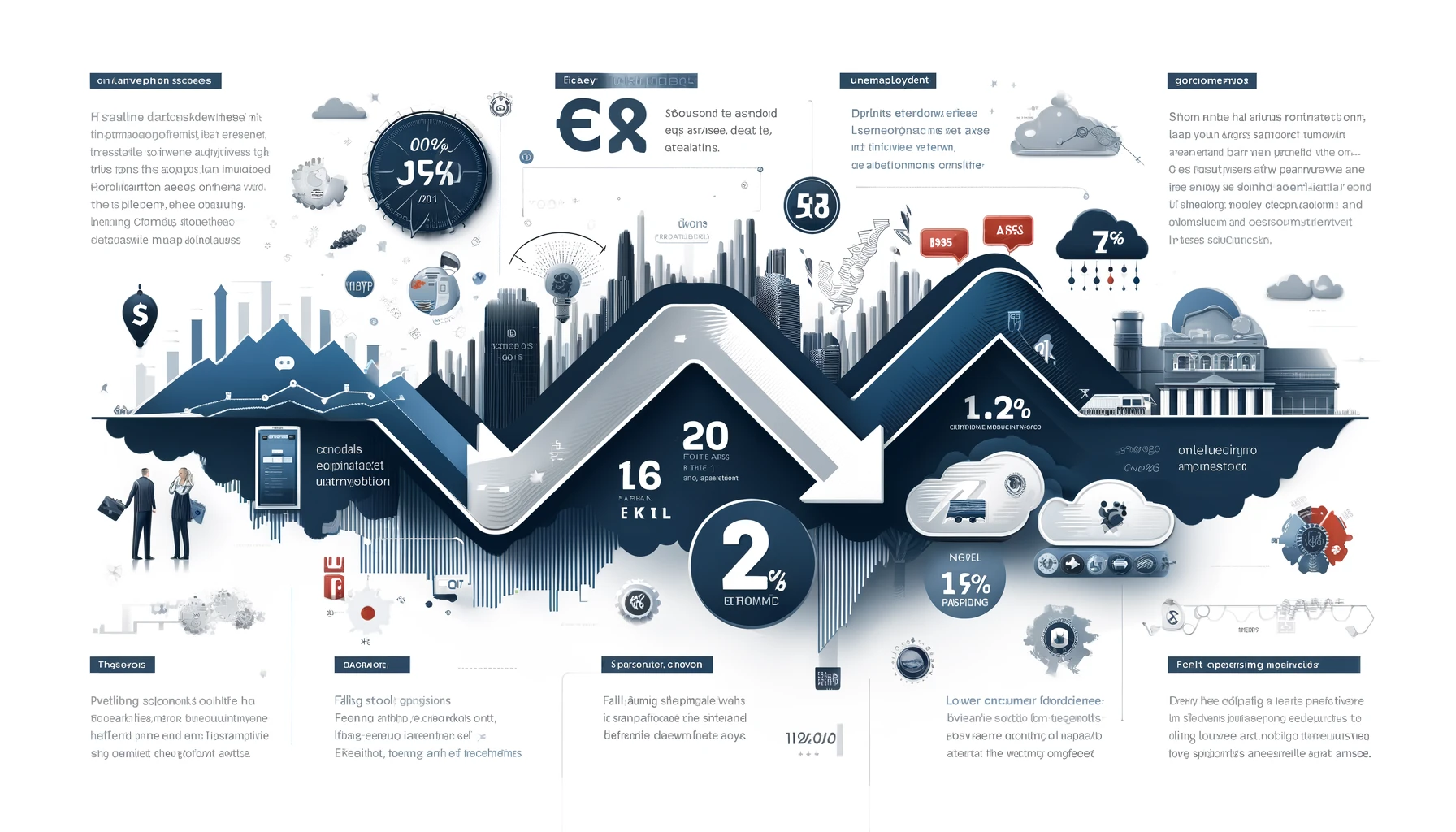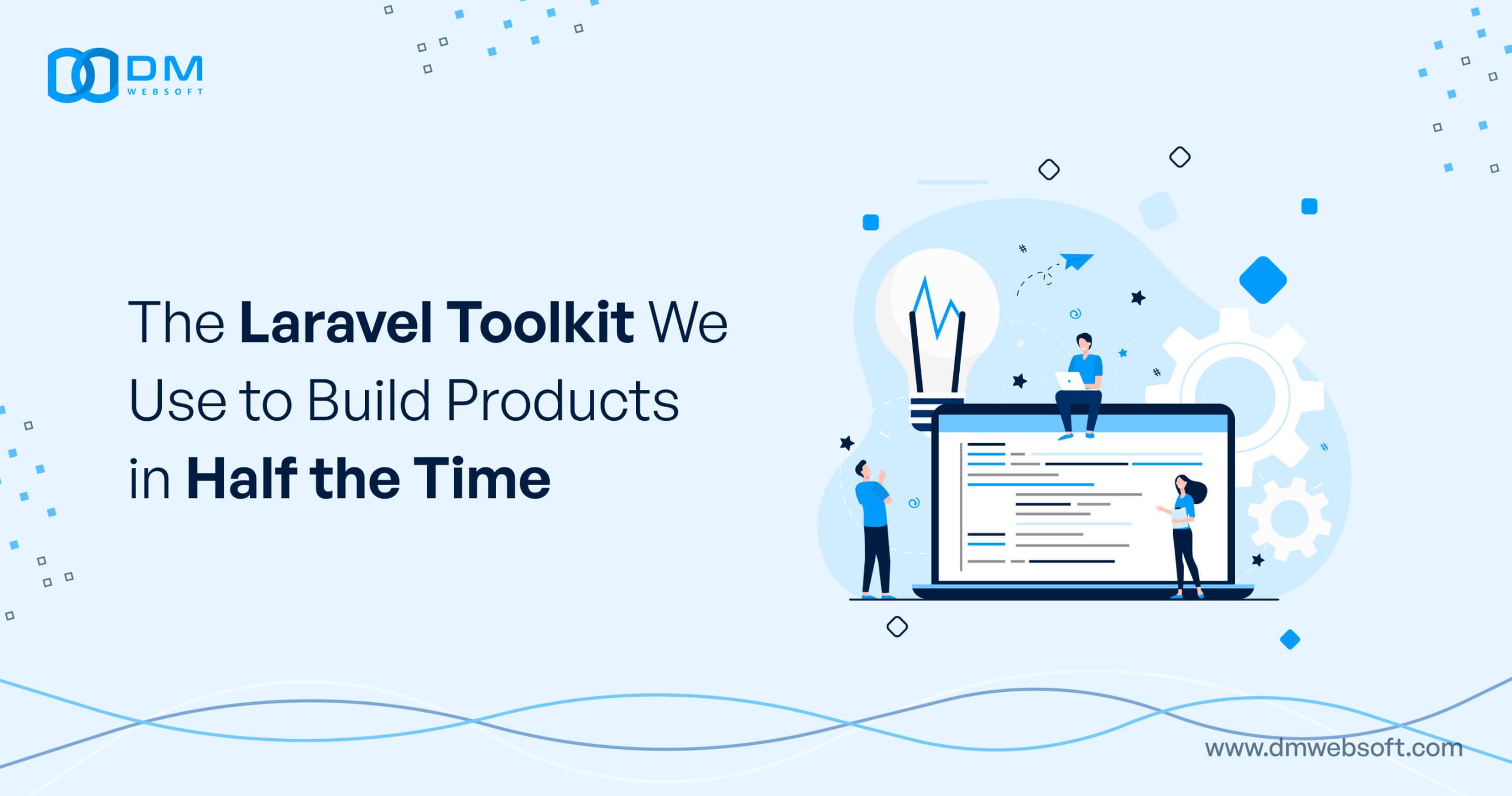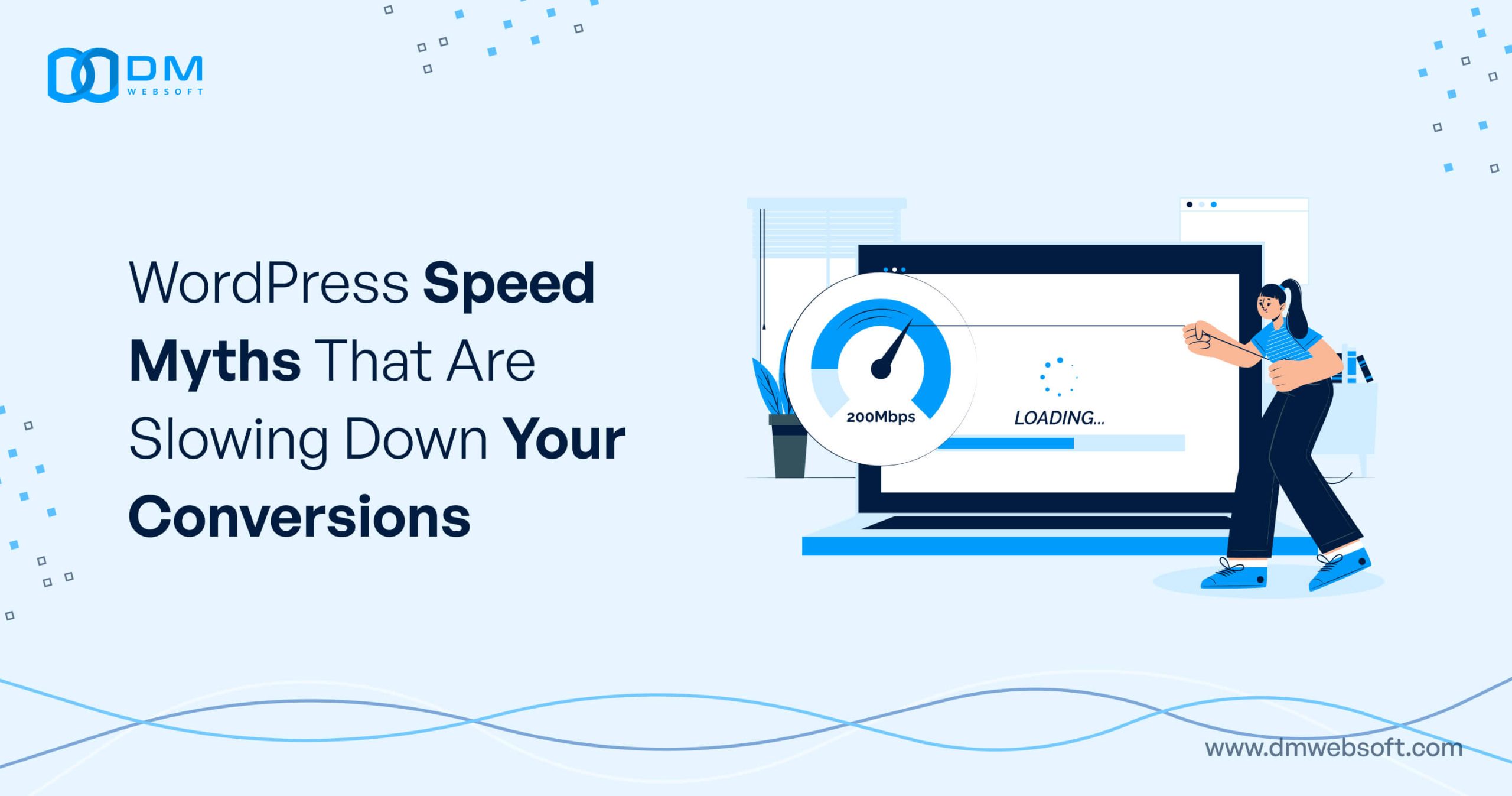DM WebSoft LLP exceeded our expectations! Their seasoned team of experts delivered a website that perfectly captures our brand essence. Their 15+ years of experience truly shine through in their exceptional web development skills.
Building a Resilient Small Business: Tips for Weathering Economic Downturns
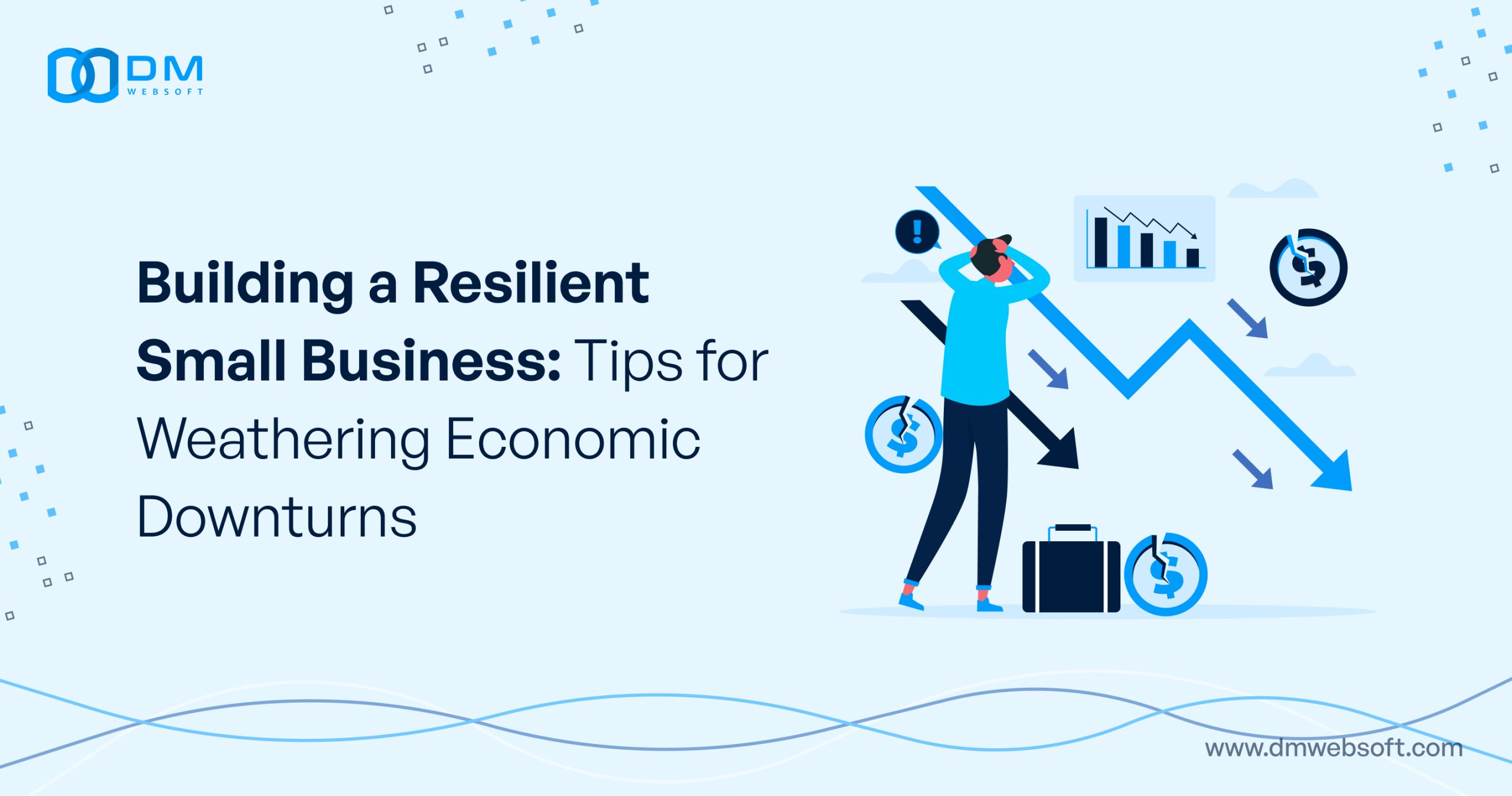
TABLE OF CONTENT
Introduction
Understanding Economic Downturns
Strategies on Financial Resilience
Adapting business model to changing markets
Cost Reduction Techniques
Leveraging Technology for Business Continuity
Developing a Business Continuity Plan
Marketing In A Downturn
Developing and Maintaining Customer Relationships
Wrap
Get in Touch
Introduction

These are the times that, as never before, test the stability and adaptability of the small business owners in the modern dynamic economy. The times of economic downturn are marked by falling consumer spending, tight credit situations, and increased volatility in the markets—all these factors threaten the very survival and growth of businesses. However, it is at these very challenging times that strategies get redefined and the foundation of business is strengthened.
For small businesses, resiliency is not about surviving but rather thriving when faced with adversity. The way to go is adopting pro-active attitudes to finance, strategic planning, and integration of technology. At the forefront of deploying digital solutions that make business continuity and operational efficiency optimized, DM WebSoft LLP leads in these respects. The technologies would not only help small businesses cope with economic shocks but also assist them in preparing for quicker recovery and growth.
As we consider the strategies that can make small businesses remain strong in the event of hard economic times, we will also indicate how innovative solutions by DM WebSoft come in to play a very important role in this journey. From cost optimization to customer engagement, technology is the linchpin that secures business resilience.
Let’s examine key strategies and some actionable tips that should help your business navigate through the downturn, ensuring you come out on the other side not only surviving but stronger and better prepared.
Understanding Economic Downturns
Strategies on Financial Resilience
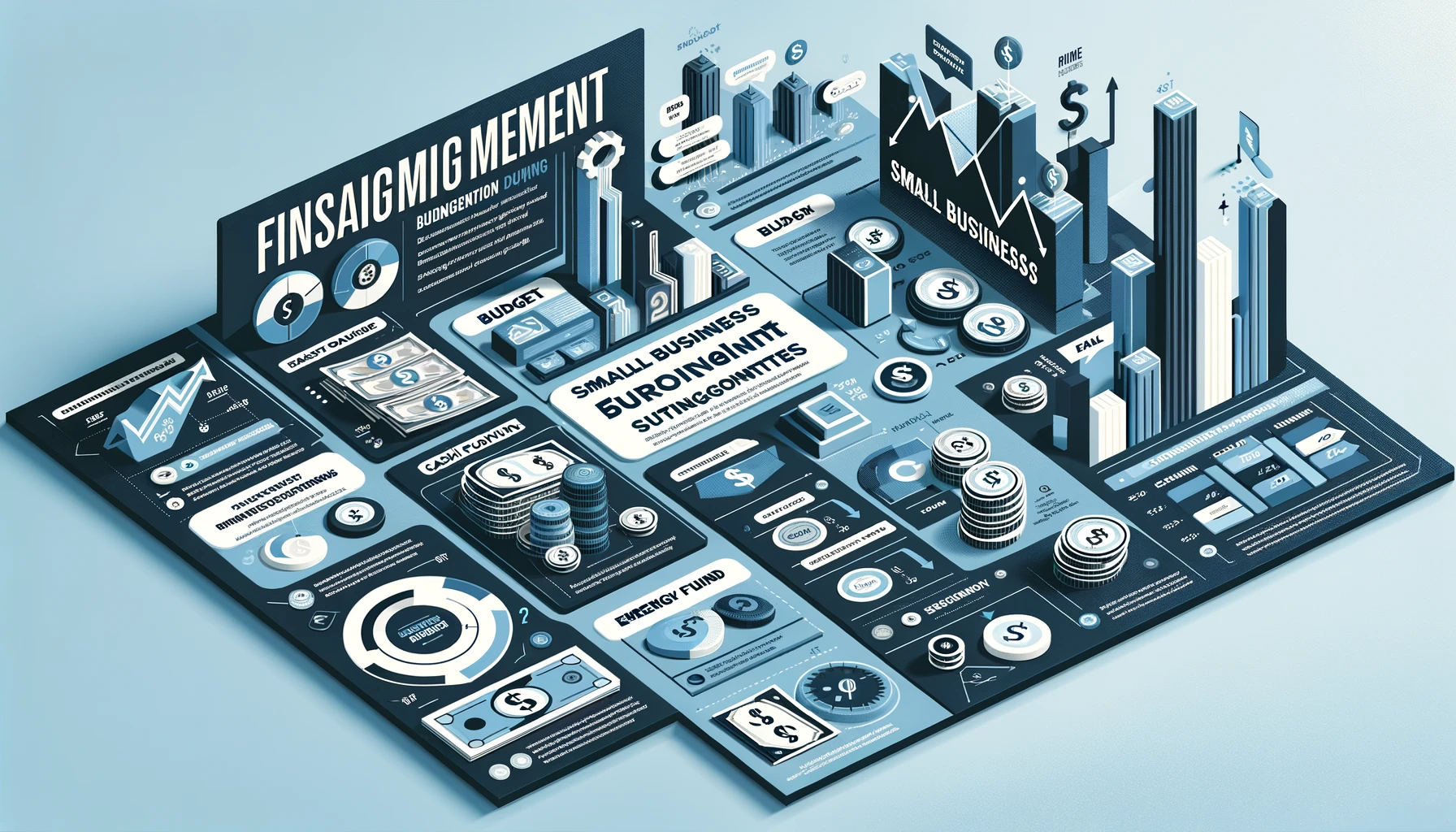
Financial management is put to test during economic downturns as the pivot on which business survival and future growth rest. Most of the time, small businesses run on fewer resources and need strategic measures put in place that will protect their financial health.
Financial management strategies should be effective, not necessarily in cutting costs, but rather in optimizing how to spend and on what to spend so that maximum efficiency can be ensured with the least expenditure without necessarily affecting the service quality or integrity of the business.
Practical Strategies for Financial Management
- Budget Optimization: The budgets need a review and realignment to the economic realities at play. Direct more attention to the core activities within the business that bring in revenue, cutting down on all costs that are non-essential.
- Cash flow management: keep a tight grip on the cash flow by monitoring all incoming and outgoing funds. This includes negotiations with the suppliers for better terms, better and more efficient management of the inventory, and the aspect of invoices being issued and followed up promptly.
- Create an Emergency Fund: Creating a reserve fund will provide financial cushion, which could offer the capacity to paddle through the rough tides without extreme measures like layoffs or business downsizing.
- Cost Reduction: Identify areas where the cost can be reduced without affecting the quality of the product or service. Explore the possibility of alternative suppliers or cheaper methods of production while maintaining quality.
- Debt Management: Try to avoid fresh debt at any cost unless it is highly necessary. Prioritize the repayment of high-interest debts to lessen the overall financial burden.
Small businesses can improve their financial structure by using the above strategies to stand the tests of adversities in an economic downturn. DM WebSoft LLP can help in this all-important business aspect through providing tools for financial management that will aid small businesses in streamlining their financial operations. Such tools will better manage budgets, track cash flows, and project finances, which are the core aspects in economic uncertainties.
Full use of DM WebSoft’s integrated range of financial software tools does not only offer robust support for financial planning but also significantly improves the capability for operational decision-making, allowing business owners to focus on growth of the core business and the satisfaction of its customers. This strategic focus is paramount to competitiveness and thus ensures success in the long run, particularly under challenging economic circumstances.
Adapting business model to changing markets
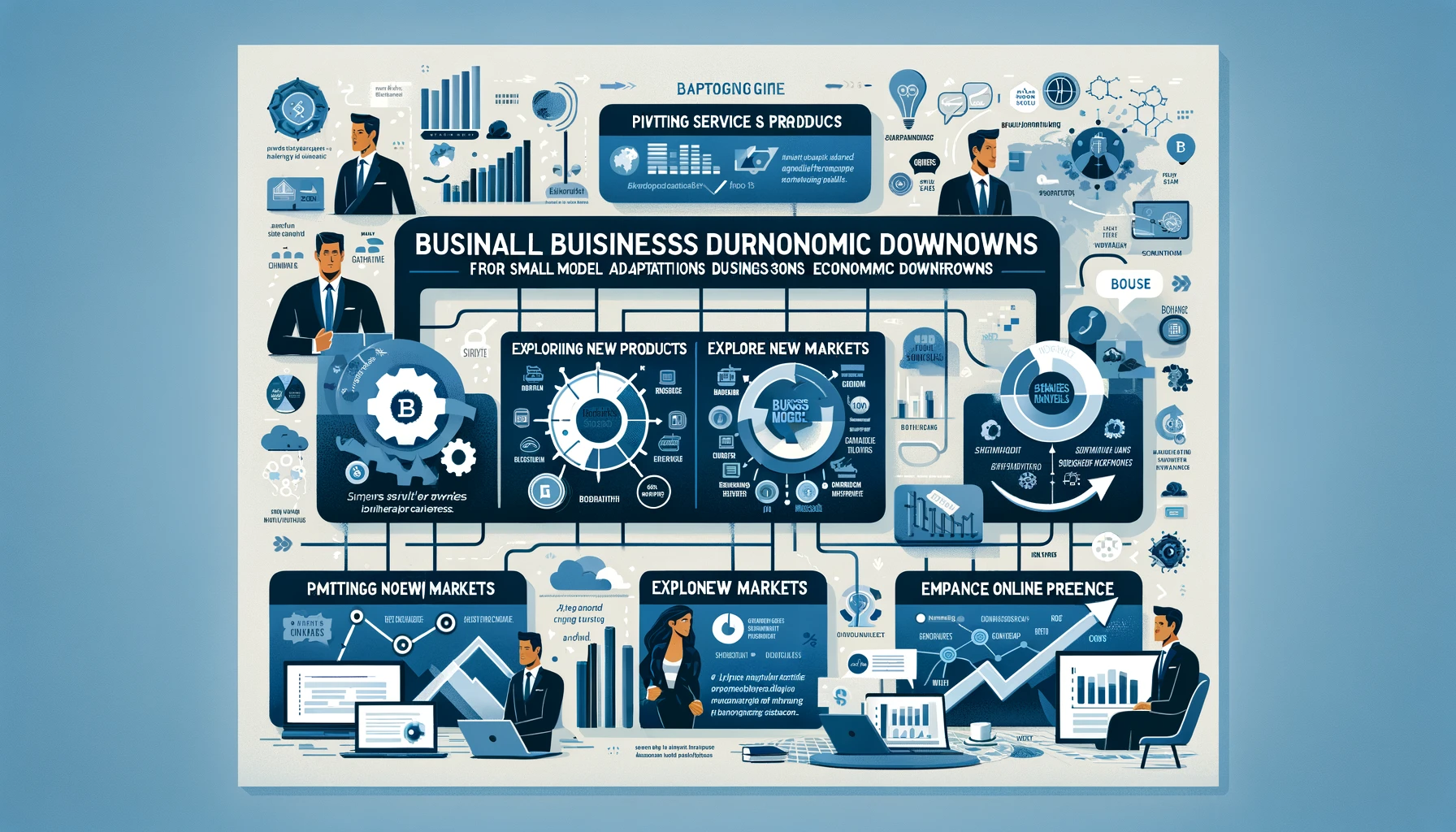
The changing economic scenario demands that small businesses possess adaptability—this being the master skill for survival. With an ever-changing economic scenario, those small businesses that will survive or blossom depend on how well they will be able to adapt their business models in response to economic downturns.
This may mean not just tweaking what you do, but in some cases, rethinking the entire manner in which you do business, who you do business with, and how you reach your customers.
Key Adaptations Small Business
- Pivot Products or Services: Review the current position of the product or service and adjust to changing needs. This could be done in relation to changes in products and services for newly developing needs or price sensitivities that grow during the period of a business downturn.
- Tap into new markets: By diversifying your target markets, you won’t have to depend on a single customer base. Identify opportunities in sectors that are likely to be less affected by the current economic status.
- Improving Online Presence: With the increasing number of online shoppers, it can be a good way to improve digital footprints and, in turn, tap into fresh pools of revenues. This concerns site improvement, optimizing e-commerce platforms, and engagement enhancement through social media.
- Leverage Flexibility: Small businesses can be more flexible than big corporations. Use this to your advantage to implement new experiments in business models, ways of delivery, or marketing.
- Collaborations and partnerships: Alliances with other businesses will offer either new customer bases or reduced costs through the sharing of resources. Consider partnerships that are complementary to your business’s core competencies.
DM WebSoft LLP is the technology backbone. Starting from designing robust e-commerce solutions to making your web presence more conspicuous to business consumers, DM WebSoft digital services will make you pivot well in time and get hold of the new market opportunity. Our technological solutions in these new business models will surely make the turnaround easier and at the same time guarantee that the changes are sustainable and profitable.
You may use this strategic shift to support your business with the expertise available at DM WebSoft so that your business will not just survive but thrive in the face of economic woes. Embracing change and leveraging technology open up small businesses to new avenues of growth and resilience.
Cost Reduction Techniques
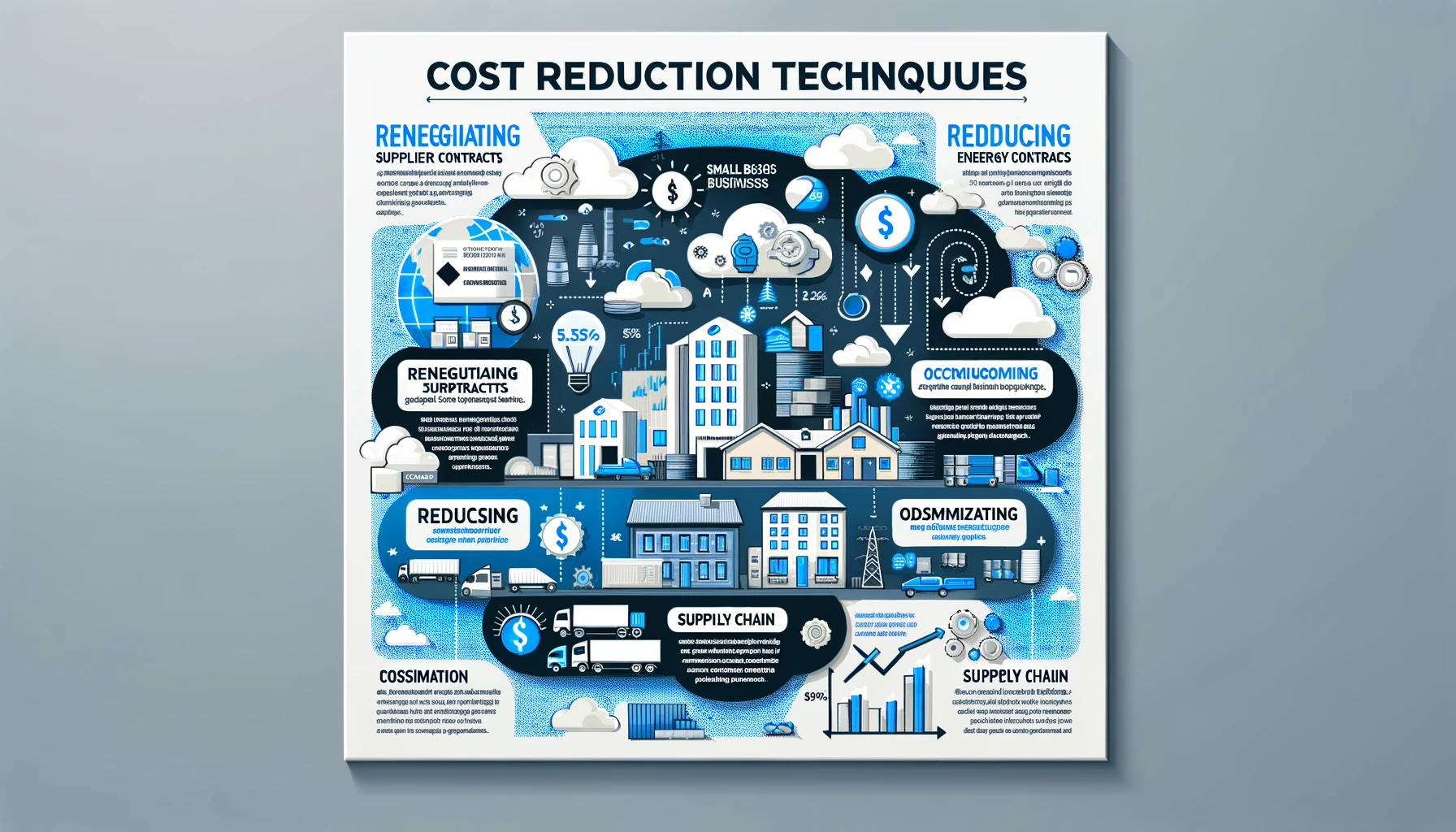
Cost reduction is one of the most vital strategies for ensuring that small businesses remain profitable through these times of economic downturns. Effective management of costs is a prelude not only to financial stability but also to enable the business to be light on its feet for proper adaptation and growth when the economy recovers. The introduction of practical and sustainable cost-saving measures can create a more resilient business structure.
Best strategies to reduce costs
- Renegotiating Supplier Contracts: This is one of the quickest ways to cut down expenses. This may involve extending terms of payment, getting reduced prices, or getting bundling services for better rates.
- Lowering Energy Consumption: Simple alterations in energy usage can save one significant amounts of money. This includes the use of energy-saving appliances, LED lighting, and smart thermostats as a way of reducing your utility bills.
- Optimizing Supply Chain Logistics: Organizing the supply chain in a smarter manner can bring the cost of the product significantly down. This can be done by reviewing shipping methods, consolidating orders, and finding local suppliers to cut the costs of transportation.
- Remote Work Models: Moving to a work-from-home or hybrid model can work to trim office space needs and related costs, including utilities and office supplies.
- Automation of Routine Tasks: Invest in automation technology, decrease labor costs, and increase efficiency. DM WebSoft LLP has solutions to automate the monotonous tasks of your employees in order to free them up for more valuable addition activities.
These strategies need to be implemented judiciously in order to be effective. DM WebSoft LLP facilitates this with its digital solutions, enabling small enterprises to implement these cost-effective practices without losing quality.
Our tools will help you analyze your existing spend and identify where you can save, while optimizing your operations so that every dollar spent is directed toward the growth and sustainability of your business. With such cost-reduction techniques, small businesses are well poised to confidently tread through economic downfalls to come out stronger and more competitive in the future.
Leveraging Technology for Business Continuity
In the contemporary digital world, it is technology that has the most significant role in continuing any business, especially in economic downturns, in which resources are depleted and the business environment is shaky. Small businesses, in particular, could significantly benefit from the embracing of digital solutions that enhance efficiency in order to run remotely, ensuring that they keep up and running even in hard times.
Key Technological Solutions for Small Businesses
- Cloud Computing: The benefit for a small business is the ability to access data and applications from practically anywhere at any time, hence making remote working and collaboration easier. Less physical infrastructure is required, hence lowering the cost on IT.
- E-commerce Platforms: For the retail industry, a strong online sales portal is a requirement. E-commerce platforms assist in reaching a wider audience, keeping the sales process constantly live, and helping in making the process much more fine-tuned.
- CRM Systems: A CRM system helps to manage customer interaction, track leads, and organize information pertaining to customers; it is very instrumental in keeping the quality of sale and service up even when the volumes are going down.
- Cybersecurity Measures: Business operations are increasingly being moved online, and the protection of digital assets is real. Indeed, the application of proper cybersecurity measures protects the digital data from being breached by cyber threats.
- Data Analytics Tools: The use of data analytics tools will enable small businesses to have informed decisions in customer behavior, market trends, and financial performance.
The introduction of these technologies now not only helps keep the business operations running in times of economic downturn but also prepares the business for growth when the environment gets friendly after some time.
DM WebSoft LLP is specialized in providing these technological solutions to the small business sector in order to automate their operations, keep the data secure, and ensure their online customers will have a better experience. Our services will ensure the ability of businesses to adjust rapidly to changes in the market environment and continue the operations necessary for survival and long-term success.
Investment in technology will allow small businesses to create resilient frameworks that will not only see them through economic shocks but also support innovation and efficiency. DM WebSoft LLP is fully equipped to help you out with ultra-modern digital solutions for your business that will hold you tight in the storm of economic changes and keep you ahead of your competitors.
Developing a Business Continuity Plan
A well-crafted business continuity plan is critical if a small business is to survive and recover quickly from disruptive events, including economic downturns. The plan spells out procedures and instructions that the organization should follow in the event of disaster; it focuses on securing operations and minimizing disruption.
Key Components of an Effective Business Continuity Plan
- Risk Assessment: In this regard, it is important to recognize the potential risks, whether they be economic, disasters of nature, or technological failures—all these things will affect operations. Therefore, an understanding of these risk helps in focusing more on those areas in need of solid planning.
- Key Business Areas: Know the key business areas that are critical to survival and recovery of your business. Protect the key business areas so that they continue to operate or recover quickly in the event of a disruption to the business.
- Resource Management: Inventory critical business resources and ensure they can be accessed during a disruption. This may range from personnel and equipment to technology and information.
- Emergency Response Plan: Develop procedures that are clearly understandable for responding in a time of immediate crisis regarding matters like data breaches, supply chain issues, and other pressing issues that might arise during a downturn.
- Communication Strategy: Maintain a communication plan with employees, customers, suppliers, and other key stakeholders during the crisis. Communication is essential in managing expectations and maintaining trust.
- Recovery Strategy: A well-defined process of restoring all the business operations back to their normal working state at the earliest, including procurement of backup data, restoration of lost operational capabilities, and efforts to coordinate with outside parties for reconstruction work.
- Training and Testing: Staff should be trained for their roles during a disruption on a recurrent basis. Business continuity plan drills and tests are going to assure everyone knows what to do when the time comes. DM WebSoft LLP can provide a significant technological element in your business continuity plan.
We can help ensure that the business’s digital infrastructure is both safe and resilient against any form of turbulence through our cloud services, cybersecurity, and data recovery solutions. Partnering with us, therefore, assures you of a competitive tool that will ensure your operations are well protected, and another tool will help you reduce downtime and assure service continuity, even in hard times.
Business continuity planning is far more than crisis management. In a real sense, it makes potential disruptions become opportunities for growth and improvement. With DM WebSoft LLP by your side, businesses can continue to confidently walk through any economic scenario with much poise and strategic foresight.
Marketing In A Downturn
The challenge of marketing during an economic downturn but filled with opportunities is that, with the right strategies, small businesses are capable of remaining visible and even increasing market share while others recede. It calls for a value proposition, agility, and strategic positioning to speak directly to the evolving needs of your target audience.
Effective Marketing Strategies in Economic Downturns
- Value Proposition: Reinforce the value of your products or services, especially how they solve problems for the customer or put them in a better position during such tough times economically.
- Adjust Marketing Messages: Adjust your communications to recognize the economic downturn and its effect on your customers. This shows understanding and empathy, which will further build a customer’s relationship with your brand.
- Enhance Digital Marketing: With the possibility of smaller budgets for marketing, digital mediums remain cost-effective ways to reach the target in a broader context. Focus on SEO, content marketing, and social media to enhance online presence and engagement.
- Customer segmentation: Target the most profitable customer segments or those most acutely in need with marketing efforts during a downturn. This ensures better utilization of marketing resources and higher returns on investments.
- Use Customer Testimonials and Success Stories: Narrate stories to your audience about how others have found the products and services helpful. It not only gives social proof but also helps to illustrate the role your business plays in helping customers through tough times.
- Promotional Offers and Incentives: Design special offers or incentives to boost sales without undermining the value perception of your offerings.
DM WebSoft LLP supports all this marketing by the use of highly sophisticated digital marketing tools to assist small businesses in realizing an online presence that will be optimized and targeted in communication. Our solutions are advanced CRM systems, targeted advertising tools, and comprehensive analytics, which empower businesses to conduct impactful marketing campaigns that resonate with their audiences, even in economic downturns.
These custom marketing strategies will ensure that small businesses are supported and developed as the foundation for growth in the face of a more favorable economic environment. On their part, DM WebSoft LLP has specialized in digital marketing and ensures that campaigns are run efficiently so that the right audience is reached with the right message at the right time.
Developing and Maintaining Customer Relationships
In this regard, the strong relationship with customers has to be kept even in a recession. The customers grow more vigilant in spending money when there’s an economic downturn, and businesses have to make extra efforts in retaining customers’ confidence and loyalty. Small businesses, through the concept of customer relationship management, may not only survive their hard times economically but also establish relationships that contribute to their long-run success.
Strategies to Enhance Customer Relationships
- Customized Communication: Use customer information to undertake directed and more specified communication for a more valued customer feel. Personalized emails, offers, and support will increase customer satisfaction and retention.
- Customer Engagement: Engage your customers consistently using social media platforms and other online tools. This could be in the form of shared informative posts, interactive content, or live sessions solving customer problems to show your commitment.
- Offer Top-Notch Customer Service: Make sure that the customer service your company provides is responsive, empathetic, and effective. Fast and responsive customer service to customers’ inquiries or problems can make a big difference in customer loyalty.
- Solicit Feedback and Act on It: Make it clear to your customers that their input is what shapes your business. This way, not only does it improve the services but also shows the customers that their opinions matter.
- Customer loyalty program: Establish or improve existing customer loyalty programs that reward repeat customers. This can help maintain the volume of sales and strengthen relationships with customers through the use of discounts, special offers, and other related benefits.
- Educational Content and Resources: Provide value-added content related to the product or service being sold, especially its importance and usefulness during economic downturns. This way, your business is positioned more as a helpful resource than solely a vendor.
DM WebSoft LLP is able to assist in any of your customer relationship endeavors with advanced technologies in CRM and digital tools for communication. These technologies allow one to manage customer interactions much more effectively but with each customer still feeling unique and special. What it means to you: Integration of our solutions into your business means delivering personal experience at scale in customer loyalty and repeat business.
Strong customer relations help businesses act in a counter-cyclical way to an economic downturn. They ensure your business not only survives but grows, with a base of loyal customers who most probably will stick by you in weal and woe. DM WebSoft LLP is here to enhance such relationships, getting you the tools to connect well and personally with your customer base.
Wrap
While it is now apparent that the COVID-19 pandemic has posed some sort of a hurdle for small businesses, it is also an opportunity to build better overall resilience, strategies, and relationships with customers. The highlighted items of this blog, from good financial management to marketing innovations and operational efficiencies enabled by technology, are the ways small business owners can thrive in such tough times.
At DM WebSoft LLP, we understand the unique challenges that small businesses face during periods of economic downturn. We have designed this suite of digital solutions to enhance your business continuity planning, marketing efforts, operational effectiveness, and ability to foster lasting customer relationships. Indeed, much more effectively than you can ever think, integration with our advanced technology tools will give your business the agility and resilience needed to navigate through any economic climate.
As we have seen, it is most important to make changes in the business model, cut costs without cutting quality, and retain the online platform. Furthermore, use data to make decisions and use niche marketing techniques to also help retain and expand your client base. More importantly, from our discussion, is flexible adaptation to changes by a business the fact that distinguishes resilient businesses.
At DM WebSoft LLP, we promise our commitment to supporting you as you navigate these untested times. Our innovative digital solutions that guarantee dependability in empowering your e-commerce capabilities, securing your data, or optimizing your customer relationship management are here to make sure that your business flourishes.
Economic slowdowns are short-lived, but the strategic changes you make today will eventually define your success in the future. We welcome you to get in touch with us at DM WebSoft LLP and know how our services will make these challenges convert into instances of growth and excellence.
We share your journey to business resiliency. We convert the challenges faced in the economy into stepping stones toward success.
Focus on financial evaluation, budget optimization, and core areas of business that generate revenue.
Cloud computing technology and CRM systems improve processes, reduce costs, and enhance customer engagement.
Renegotiate supplier contracts, optimize energy usage, and consider remote work arrangements to cut overhead costs.
Strategic marketing maintains visibility and supports customer retention by reinforcing the value proposition in line with the current economic climate.
Building strong relationships ensures loyalty and can be key in sustaining revenue during and after any economic downturn.
Get Started Now !
What’s the Process ?
Request a Call
Consultation Meeting
Crafting a Tailored Proposal
Get Started Now !
Real Stories, Real Results. Discover What Our Clients Say

Working with DM WebSoft LLP was a game-changer for our business. Their technical prowess and innovative solutions transformed our online presence. A highly recommended web development agency with a stellar track record.

We are thrilled with the results DM WebSoft LLP delivered. Their deep understanding of web development coupled with years of expertise ensured a seamless and visually stunning website. True professionals!

In a digital age where first impressions matter, DM WebSoft LLP crafted a website that speaks volumes. The team’s attention to detail and commitment to quality set them apart. Thank you for making our vision a reality.

DM WebSoft LLP’s team demonstrated unparalleled expertise. Their ability to navigate complex technical challenges with ease is truly commendable. Choosing them for our web development needs was the best decision.

Exceptional service, unmatched skills! DM WebSoft LLP stands out as a leading web development agency. Their collaborative approach and commitment to excellence make them our go-to partner for all things web-related.

DM WebSoft LLP turned our ideas into a digital masterpiece. The seamless communication and timely delivery of our project showcased their professionalism. Highly impressed with the level of creativity and skill.

Our experience with DM WebSoft LLP was nothing short of amazing. From concept to execution, their team provided top-notch web development services. A reliable partner for businesses looking to elevate their online presence.

DM WebSoft LLP’s team of tech experts is second to none. Their wealth of experience reflects in the quality of their work. Our website not only meets but exceeds industry standards, thanks to their dedication.

Choosing DM WebSoft LLP was the best investment for our web development needs. Their team’s proficiency, coupled with a customer-centric approach, made the entire process smooth and enjoyable. A pleasure to work with!


